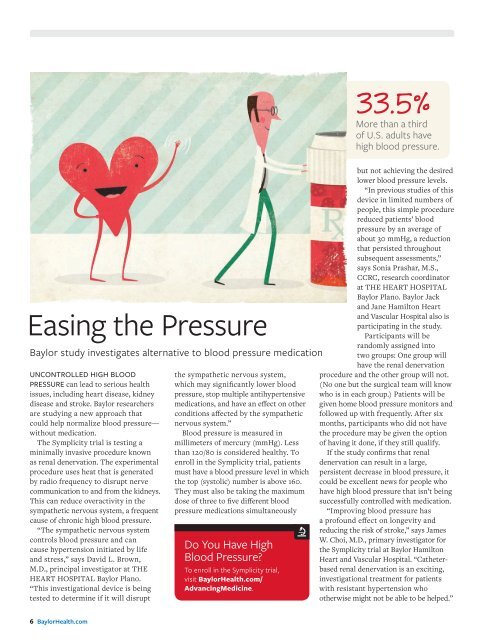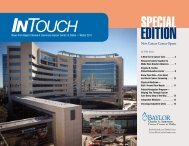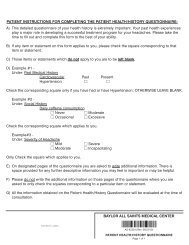McKinney - Baylor Online Newsroom - Baylor Health Care System
McKinney - Baylor Online Newsroom - Baylor Health Care System
McKinney - Baylor Online Newsroom - Baylor Health Care System
You also want an ePaper? Increase the reach of your titles
YUMPU automatically turns print PDFs into web optimized ePapers that Google loves.
33.5%<br />
More than a third<br />
of U.S. adults have<br />
high blood pressure.<br />
Easing the Pressure<br />
<strong>Baylor</strong> study investigates alternative to blood pressure medication<br />
UNCONTROLLED HIGH BLOOD<br />
PRESSURE can lead to serious health<br />
issues, including heart disease, kidney<br />
disease and stroke. <strong>Baylor</strong> researchers<br />
are studying a new approach that<br />
could help normalize blood pressure—<br />
without medication.<br />
The Symplicity trial is testing a<br />
minimally invasive procedure known<br />
as renal denervation. The experimental<br />
procedure uses heat that is generated<br />
by radio frequency to disrupt nerve<br />
communication to and from the kidneys.<br />
This can reduce overactivity in the<br />
sympathetic nervous system, a frequent<br />
cause of chronic high blood pressure.<br />
“The sympathetic nervous system<br />
controls blood pressure and can<br />
cause hypertension initiated by life<br />
and stress,” says David L. Brown,<br />
M.D., principal investigator at THE<br />
HEART HOSPITAL <strong>Baylor</strong> Plano.<br />
“This investigational device is being<br />
tested to determine if it will disrupt<br />
the sympathetic nervous system,<br />
which may significantly lower blood<br />
pressure, stop multiple antihypertensive<br />
medications, and have an effect on other<br />
conditions affected by the sympathetic<br />
nervous system.”<br />
Blood pressure is measured in<br />
millimeters of mercury (mmHg). Less<br />
than 120/80 is considered healthy. To<br />
enroll in the Symplicity trial, patients<br />
must have a blood pressure level in which<br />
the top (systolic) number is above 160.<br />
They must also be taking the maximum<br />
dose of three to five different blood<br />
pressure medications simultaneously<br />
Do You Have High<br />
Blood Pressure<br />
To enroll in the Symplicity trial,<br />
visit <strong>Baylor</strong><strong>Health</strong>.com/<br />
AdvancingMedicine.<br />
but not achieving the desired<br />
lower blood pressure levels.<br />
“In previous studies of this<br />
device in limited numbers of<br />
people, this simple procedure<br />
reduced patients’ blood<br />
pressure by an average of<br />
about 30 mmHg, a reduction<br />
that persisted throughout<br />
subsequent assessments,”<br />
says Sonia Prashar, M.S.,<br />
CCRC, research coordinator<br />
at THE HEART HOSPITAL<br />
<strong>Baylor</strong> Plano. <strong>Baylor</strong> Jack<br />
and Jane Hamilton Heart<br />
and Vascular Hospital also is<br />
participating in the study.<br />
Participants will be<br />
randomly assigned into<br />
two groups: One group will<br />
have the renal denervation<br />
procedure and the other group will not.<br />
(No one but the surgical team will know<br />
who is in each group.) Patients will be<br />
given home blood pressure monitors and<br />
followed up with frequently. After six<br />
months, participants who did not have<br />
the procedure may be given the option<br />
of having it done, if they still qualify.<br />
If the study confirms that renal<br />
denervation can result in a large,<br />
persistent decrease in blood pressure, it<br />
could be excellent news for people who<br />
have high blood pressure that isn’t being<br />
successfully controlled with medication.<br />
“Improving blood pressure has<br />
a profound effect on longevity and<br />
reducing the risk of stroke,” says James<br />
W. Choi, M.D., primary investigator for<br />
the Symplicity trial at <strong>Baylor</strong> Hamilton<br />
Heart and Vascular Hospital. “Catheterbased<br />
renal denervation is an exciting,<br />
investigational treatment for patients<br />
with resistant hypertension who<br />
otherwise might not be able to be helped.”<br />
6 <strong>Baylor</strong><strong>Health</strong>.com

















